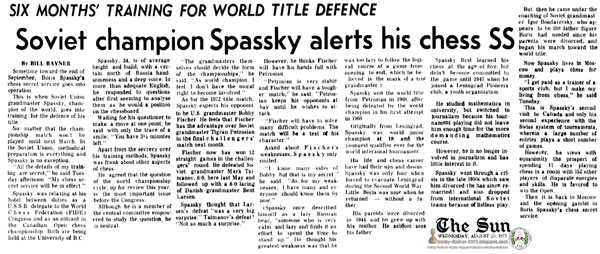The Vancouver Sun Vancouver, British Columbia, Canada Wednesday, August 25, 1971 - Page 30
Six Months' Training For World Title Defense - Soviet Champion Spassky Alerts His Chess SS by Bill Rayner
Sometimes toward the end of September, Boris Spassky's chess secret service goes into operation.
This is when Soviet Union grandmaster Spassky, champion of the world, goes into training for the defense of his title.
No matter that the championship match won't be played until next March. In the Soviet Union, methodical preparation is everything and Spassky is no exception.
“All the details of my training are secret,” he said Tuesday afternoon. “My chess secret service will be in effect.”
Spassky was relaxing at his hotel between duties as a U.S.S.R. delegate to the World Chess Federation (FIDE) Congress and as an entrant in the Canadian Open chess championship. Both are being held at the University of B.C.
Spassky, 34, is of average height and build, with a certain north of Russia handsomeness and a deep voice. In more than adequate English, he responded to questions after first seeming to analyze them as he would a position on the chessboard.
Waiting for his questioner to make a move at one point, he said with only the trace of a smile: “You have 3½ minutes left.”
Apart from the secrecy over his training methods, Spassky was frank about other aspects of chess.
He agreed that the question of the world championship cycle, up for review this year, is the most important issue before the Congress.
Although he is a member of the central committee empowered to study the question, he is neutral.
“The grandmasters themselves should decide the form of the championships,” he said. “As world champion, I feel I don't have the moral right to become involved.”
As for the 1972 title match, Spassky expects his opponent to be U.S. grandmaster Bobby Fischer. He feels that Fischer has the advantage over Soviet grandmaster Tigran Petrosian in the final challengers' match next month.
Fischer now has won 12 straight games in the challengers' round. He defeated Soviet grandmaster Mark Taimanov, 6-0, here last May and followed up with 6-0 lacing of Danish grandmaster Bent Larsen.
Spassky thought that Larsen's defeat “was a very big surprise.” Taimanov's defeat? “Not so much a surprise.”
However, he thinks Fischer will have his hands full with Petrosian.
“Petrosian is very stable and Fischer will have a tougher match,” he said. “Petrosian keeps his opponents at bay until he wishes to attack.
“Fischer will have to solve many difficult problems. The match will be a test of his character.”
Asked about Fischer's weaknesses, Spassky only smiled.
“I know many sides of Bobby but that is my secret,” he said. “As for my weaknesses, I have many and everyone should know them by now.”
(Spassky once described himself as a lazy Russian bear, ”someone who is very calm and lazy and finds it an effort to spend the time to stand up.” He thought his greatest weakness was that he was too lazy to follow the logical course of a game from opening to end, which he believed is the mark of a true grandmaster.)
Spassky won the world title from Petrosian in 1969, after being defeated by the world champion in his first attempt in 1966.
Originally from Leningrad, Spassky was world junior champion at 18 and the youngest qualifier ever for the world interzonal tournament.
His life and chess career have had their ups and downs. Spassky was only four when forced to evacuate Leningrad during the Second World War. Little Boris was nine when he returned — without a father.
His parents were divorced in 1944 and he grew up with his mother. He seldom sees his father.
Spassky first learned his chess at the age of five, but didn't become committed to the game until 1947 when he joined a Leningrad Pioneers club, a youth organization.
He studied mathematics in university, but switched to journalism because his tournament playing did not leave him enough time for the more demanding mathematics course.
However, he is no longer involved in journalism and has little interest in it.
Spassky went through a crisis in late 1950s which saw him divorced (he has since remarried) and also dropped from international Soviet teams because of listless play.
But then he came under the coaching of Soviet grandmaster Igor Bondarevsky, who appears to be the father figure Boris had needed since his parents were divorced, and began his march toward the world title.
Now Spassky lives in Moscow and plays chess for money.
“I get paid as a trainer of a sports club, but I make my living from chess,” he said Tuesday.
This is Spassky's second visit to Canada and only his second experience with the Swiss system of tournaments, wherein a large number of entries plays a short number of games.
However, he views with equanimity the prospect of spending 11 days playing chess in a room with 152 other players of disparate energies and skills. He is favored to win the Open.
Then it is back to Moscow and the opening gambit in Boris Spassky's chess secret service.
























